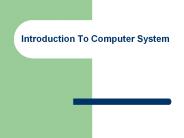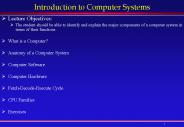Computability - PowerPoint PPT Presentation
Title:
Computability
Description:
First shown by Alan Turing in 1936. Before digital computers existed! 8 ... { System.out.println('Alan Turing was a genius.'); 11. haltingTest2. public class ... – PowerPoint PPT presentation
Number of Views:33
Avg rating:3.0/5.0
Title: Computability
1
Computability
- CS 101E
- Spring 2007
- Michele Co
2
So Far In Class
- Weve seen the following programming constructs
- if, if-else, if-else-if
- switch
- for
- while
- do-while
- And
- break
- continue
These are powerful constructs that allow us
to express many computations
3
Can Computers be Programmed to Solve Any Problem?
- Yes
- No
- Maybe
4
Can Humans Solve Any Problem?
- Yes
- No
- Maybe
5
Epimenides Paradox
- This statement is false.
- Proof
- Let A This statement is false.
- Assume A is false
- Then, A must be true
- Assume A is true
- Then, A is false
- No matter what truth value assigned, a
contradiction is reached!
6
The Halting Problem
7
The Halting problem
- Given a program P, and input I, will the program
P ever terminate? - Meaning will P(I) loop forever or halt?
- Can a computer program determine this?
- Can a human?
- First shown by Alan Turing in 1936
- Before digital computers existed!
8
Solving the Halting Problem
- To solve the halting problem means we create a
method CheckHalt(P,I) - P is the program we are checking for halting
- I is the input to that program
- And it will return loops forever or halts
- Note it must work for any program, not just some
programs
9
Can a human determine if a program halts?
- Given a program of 10 lines or less, can a human
determine if it halts? - Assuming no tricks the program is completely
understandable - And assuming the computer works properly, of
course - And we ignore the fact that an int will max out
at 4 billion
10
haltingTest1
- public class haltingTest1
- public static void main(String args)
- System.out.println("Alan Turing was a
genius.")
11
haltingTest2
- public class haltingTest2
- public static void main(String args)
- for (int factor 1 factor lt 10 factor )
- System.out.println("Factor is " factor)
12
haltingTest3
- public class haltingTest3
- public static void main(String args)
- while(true)
- System.out.println("Hello world!")
13
haltingTest4
- public class haltingTest4
- public static void main(String args)
- int x 10
- while ( x gt 0 )
- System.out.println(hello world)
- x
14
Can Computers be Programmed to Solve Any Problem?
- Yes
- No
- Maybe
15
Can Humans Solve Any Problem?
- Yes
- No
- Maybe
16
Another Problem
- Perfect Numbers
17
Perfect numbers
- Numbers whose divisors (not including the number)
add up to the number - 6 1 2 3
- 28 1 2 4 7 14
- The list of the first 10 perfect numbers6, 28,
496, 8128, 33550336, 8589869056, 137438691328,
2305843008139952128, 26584559915698317446546926159
53842176, 1915619426082361072947933780843036381309
97321548169216 - The last one was 54 digits!
- All known perfect numbers are even its an open
(i.e. unsolved) problem if odd perfect numbers
exist - Sequence A000396 in OEIS
18
Odd perfect number search
- public class searchForOddPerfectNumber
- public static void main(String args)
- int n 1 // arbitrary-precision
integer - while (true)
- int sumOfFactors 0
- for (int factor 1 factor lt n
factor) - if ((n factor) 0)
- sumOfFactors
- sumOfFactors factor
- // if
- // for loop
- // if its a perfect number
- if (sumOfFactors n)
- break
- n n 2
Using int for code clarity. Really need a
larger precision type... BigInteger or larger
19
Can Computers be Programmed to Solve Any Problem?
- Yes
- No
- Maybe
20
Can Humans Solve Any Problem?
- Yes
- No
- Maybe
21
Where does that leave us?
- If a human cant figure out how to do the halting
problem, we cant make a computer do it for us - It turns out that it is impossible to write such
a CheckHalt() method - But how to prove this?
22
CheckHalt()s non-existence
- Consider P(I) a program P with input I
- Suppose that CheckHalt(P,I) exists
- Tests if P(I) will either loop forever or
halt - A program is a series of bits
- And thus can be considered data as well
- Thus, we can call CheckHalt(P,P)
- Its using the bytes of program P as the input to
program P
23
CheckHalt()s non-existence
- Consider a new method
- Test(P)
- loops forever if CheckHalt(P,P) prints
halts - halts if CheckHalt(P,P) prints loops
forever - Do we agree that Test() is a valid method?
- Now run Test(Test)
- If Test(Test) halts
- Then CheckHalt(Test,Test) returns loops
forever - Which means that Test(Test) loops forever
- Contradiction!
- If Test(Test) loops forever
- Then CheckHalt(Test,Test) returns halts
- Which means that Test(Test) halts
- Contradiction!
24
Why do we care about the halting problem?
- It was the first algorithm that was shown to not
be able to exist - You can prove an existential by showing an
example (a correct program) - But its much harder to prove that a program can
never exist































